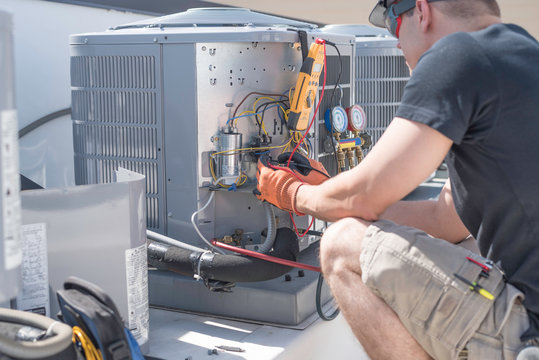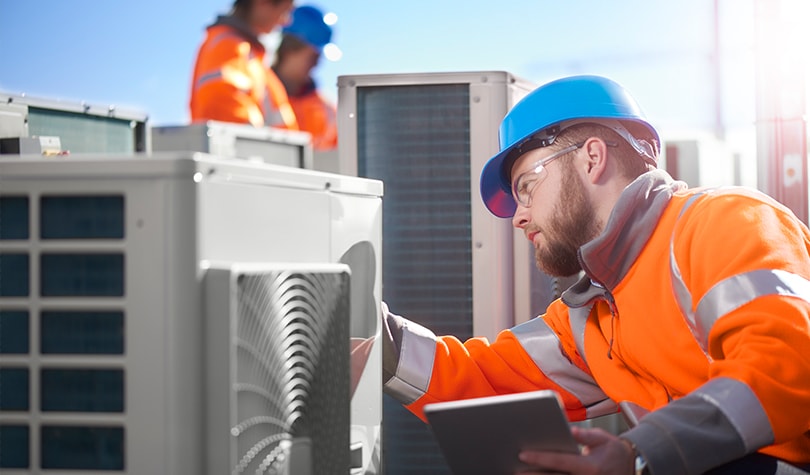AC repairman checklist: key parts to check
Everything about A/c: Identifying Common Issues and Effective A/c Repair Service Techniques
HVAC systems are critical for maintaining interior convenience. Comprehending their elements and functionality is important for identifying usual problems. House owners typically face problems such as inadequate cooling, strange odors, or rising energy prices. These indications can suggest underlying issues that might need attention. Discovering do it yourself troubleshooting strategies can be valuable, however knowing when to look for expert assistance is equally important. What actions can be required to assure lasting performance?
Recognizing Your A/c System: Components and Functionality
A cooling and heating system, typically considered the backbone of indoor climate control, contains several essential parts that interact to regulate temperature and air high quality. The main elements consist of the home heating unit, air flow system, and air conditioning unit. The home heating device, generally a heating system or central heating boiler, creates heat during chillier months, while the cooling unit cools indoor rooms throughout the summertime.

Common A/c Problems Home Owners Experience
House owners often encounter several usual heating and cooling troubles, including inconsistent temperature level distribution throughout their living rooms. Furthermore, uncommon noises during operation can suggest underlying issues that need attention. Attending to these concerns immediately is essential for preserving ideal system performance.
Irregular Temperature Level Distribution
Many houses experience the frustrating problem of irregular temperature level distribution, where specific areas really feel uncomfortably warm while others continue to be too cold. This issue usually arises from a range of aspects, including poor insulation, obstructed vents, or an improperly sized HVAC system. When ducts are not properly sealed or when furniture blocks air flow, some rooms might receive inadequate air conditioning. Additionally, thermostat placement can greatly affect temperature policy; a thermostat located in a sunlit area may misstate the overall temperature level of your home. Regular upkeep, consisting of cleaning filters and ensuring ductwork is clear, can help relieve these inconsistencies. House owners might likewise think about zoning systems to better control temperatures throughout different locations of the home, advertising a more comfy living environment.
Uncommon Sounds Throughout Operation
When an a/c system runs, uncommon sounds can suggest underlying problems that require attention. Homeowners might run into a series of noises, such as grinding, squealing, or hissing. Grinding sounds frequently indicate worn-out bearings or components, while squeaking can suggest loose belts or parts requiring lubrication. Hissing may indicate a cooling agent leakage, which can jeopardize the system's efficiency. In addition, banging noises might indicate loosened ductwork or an issue with the blower follower. Each of these noises functions as a caution, motivating house owners to examine further. Ignoring these indicators can result in even more considerable problems and pricey repair work. Regular upkeep and prompt interest to uncommon noises can improve system longevity and efficiency, guaranteeing a comfy living environment.
Indications That Indicate Your AC Requirements Repair
Just how can one tell if their a/c device wants fixing? A number of indicators may suggest underlying problems calling for expert focus. If the Air conditioner stops working to cool down the space efficiently, it might recommend a refrigerant leakage or compressor breakdown. Furthermore, an increase in power expenses without corresponding usage adjustments could signal inadequacy in the system. Property owners must likewise be alert to unusual scents emanating from the unit, which could suggest mold and mildew growth or electric problems. If the Air conditioner regularly cycles on and off, it could be a sign of a faulty thermostat or various other mechanical problems. The presence of water pooling around the unit can indicate a clogged drain line. Recognizing these indications early can save time and money, making sure that the a/c system operates effectively and efficiently.
DIY Troubleshooting Techniques for Heating And Cooling Issues
When facing heating and cooling issues, property owners can employ several do it yourself fixing methods to identify the trouble. Secret techniques consist of checking thermostat settings, inspecting air filters, and evaluating drainage problems. These steps can help determine typical malfunctions before looking for redirected here specialist help.
Inspecting Thermostat Settings
What actions should house owners take to guarantee their thermostat setups are appropriate? First, they must verify the thermostat is readied to the preferred temperature and setting, whether heating or air conditioning. Inspecting for a clear display screen and verifying the thermostat is not established to "hold" or "getaway" setting is crucial. Property owners need to likewise validate that the thermostat is level and mounted in a place free from drafts, straight sunshine, or other temperature level influences. Furthermore, recalibrating the thermostat can check over here assist provide precise analyses. If the thermostat operates on batteries, replacing them might deal with any problems. By methodically examining these factors, home owners can typically identify and fix thermostat-related problems, advertising ideal a/c system performance.
Inspecting Air Filters
Air filters play a crucial role in preserving suitable HVAC efficiency. They catch dust, irritants, and various other particles, ensuring tidy air circulation. Gradually, filters can end up being clogged, minimizing air movement and efficiency. To examine air filters, individuals need to first locate the filter, frequently discovered in the return duct or near the furnace. When situated, they ought to examine the filter's problem-- if it shows up unclean or stained, it most likely needs replacement. Many filters call for changing every 1-3 months, depending on use and ecological variables. Regular assessment and prompt replacement of air filters not only improve air quality but also prolong the lifespan of HVAC systems, stopping prospective breakdowns and costly repair work.
Reviewing Drain Issues
Just how can home owners successfully determine and attend to drainage concerns within their a/c systems? First, they should evaluate the condensate drainpipe line for clogs or clogs, which can cause water build-up. House owners may make use of a wet/dry vacuum cleaner to clear any kind of debris blocking the line. Next, examining the drain frying pan for rust or leakages is essential, as a harmed pan can cause water to overflow. Normal cleansing of the drain line with a mix of vinegar and water assists prevent future blockages. In addition, making certain appropriate incline of the drain line advertises reliable water flow. If these do it yourself strategies do not resolve the problem, speaking with a professional cooling and heating specialist might be necessary to prevent possible water damages and system failure.
When to Call an Expert for Air Conditioner Repair Work

While some air conditioning concerns can be handled with do it yourself approaches, there are situations where calling an expert comes to be essential. Property owners should look for skilled aid when they come across persistent issues, such as insufficient air conditioning, odd sounds, or unusual odors rising from the unit. These signs and symptoms might indicate deeper issues that call for specialized understanding and tools to diagnose and fix correctly.

Preventative Upkeep Tips for Cooling And Heating Durability
Normal preventative upkeep can substantially boost the long life of HVAC systems. Homeowners ought to schedule annual assessments by certified specialists to examine system performance check my blog and recognize potential issues. Regularly changing or cleaning air filters is vital, as this assurances correct air flow and decreases stress on the system. Additionally, inspecting and sealing ductwork prevents energy loss and enhances total performance.
It is also recommended to keep the exterior unit free from debris and plants, enabling peak air movement and warmth exchange. Homeowners should examine the condensate drain for clogs to stay clear of water damages and mold growth. Preserving appropriate thermostat setups and utilizing programmable choices can enhance power effectiveness. Documenting upkeep activities helps track solution history and can aid in identifying recurring concerns. By complying with these preventative steps, people can take full advantage of the performance and life expectancy of their cooling and heating systems
Frequently Asked Concerns
Just how Typically Should I Replace My Cooling And Heating System Filters?
A/c system filters ought to usually be changed every one to 3 months, relying on usage, filter kind, and environmental elements. Routine substitute aids preserve performance and air high quality, making sure peak system efficiency throughout the year.
What Size Heating And Cooling System Do I Required for My Home?
To establish the suitable a/c system dimension for a home, one need to take into consideration square video, insulation top quality, and local climate. Consulting a professional can help assure optimal effectiveness and comfort for the particular living space.
Exist Eco-Friendly Cooling And Heating Options Available?
Yes, green cooling and heating alternatives are readily available, consisting of energy-efficient heatpump, solar-powered systems, and geothermal home heating. These choices lower power usage and ecological impact, promoting sustainability while keeping reliable environment control for domestic and industrial spaces.
How Can I Boost My heating and cooling System's Energy Effectiveness?
To improve HVAC power performance, one can regularly keep the system, seal air leakages, set up programmable thermostats, use energy-efficient filters, and guarantee ample insulation throughout the home to reduce energy intake and improve performance.

What Is the Typical Life Expectancy of an A/c System?
The ordinary lifespan of a cooling and heating system generally ranges from 15 to 25 years, depending on factors such as maintenance, use, and the top quality of installment. Normal maintenance can considerably prolong its operational longevity.
Conclusion
In summary, a comprehensive understanding of heating and cooling systems empowers homeowners to recognize usual problems and address small issues properly. Identifying signs of malfunction, employing do it yourself repairing methods, and focusing on normal maintenance can improve system performance and performance. When faced with intricate repair work, employing expert assistance is important to ensure security and durability. By fostering awareness and aggressive treatment, people can delight in a comfortable indoor setting while decreasing unforeseen expenses associated with a/c failures.